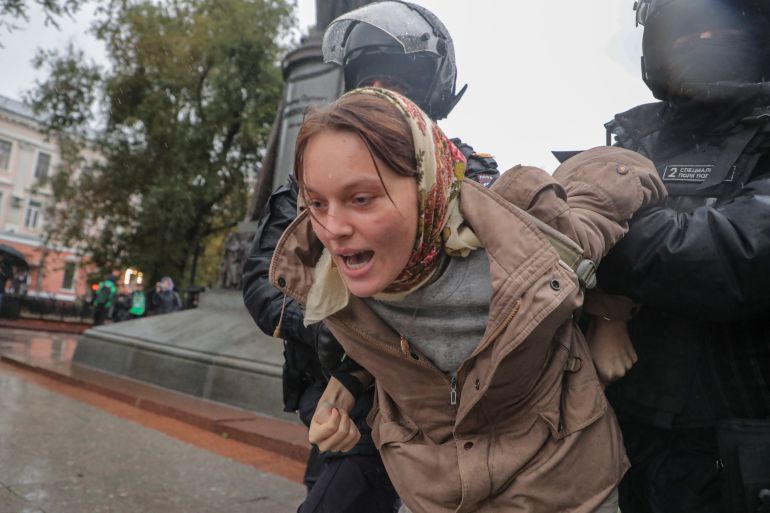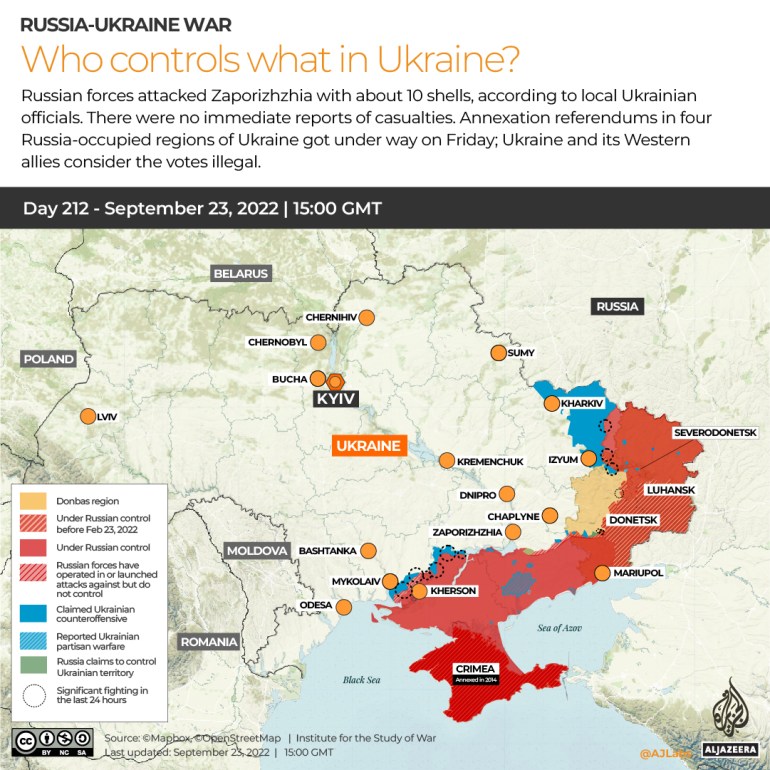Criticism grows louder over Russia’s chaotic troop mobilisation
Military call-up has been criticised by the Kremlin’s own supporters – something unheard of in Russia since its ‘special military operation’ in Ukraine began.

Russia’s two most senior lawmakers on Sunday addressed a string of complaints about Russia’s mobilisation drive, ordering regional officials to get a handle on the situation and swiftly solve the “excesses” that have stoked public anger.
Valentina Matviyenko, the chairwoman of Russia’s upper house, the Federation Council, said she was aware of reports of men who should be ineligible for the draft being called up.
Keep reading
list of 4 itemsRussia announces exemptions from Ukraine war mobilisation
What if Vladimir Putin used nuclear weapons in Ukraine?
Iran responds to Ukraine diplomatic demotion over Russia drones
“Such excesses are absolutely unacceptable and I consider it absolutely right that they are triggering a sharp reaction in society,” she said in a post on the Telegram messaging app.
In a direct message to Russia’s regional governors – who she said had “full responsibility” for implementing the call-up – she wrote: “Ensure the implementation of partial mobilisation is carried out in full and absolute compliance with the outlined criteria. Without a single mistake.”
Vyacheslav Volodin, speaker of the State Duma, Russia’s lower chamber, also expressed concern in a separate post.
“Complaints are being received,” he said. “If a mistake is made, it is necessary to correct it… Authorities at every level should understand their responsibilities.”
‘Butcher of Mariupol’
The strongly pro-Kremlin editor of Russia’s state-run RT news channel also expressed anger that enlistment officers are sending call-up papers to the wrong men as frustration about the military mobilisation grows.
Russia’s first public mobilisation since World War II – needed to shore up its faltering Ukraine war – has triggered a rush for the border with hundreds of arrests and widespread unease among the population.
The move has also attracted criticism from the Kremlin’s own supporters, something almost unheard of in Russia since the invasion began.
“It has been announced that privates can be recruited up to the age of 35. Summonses are going to 40-year-olds,” the RT editor-in-chief, Margarita Simonyan, railed on her Telegram channel.
“They’re infuriating people as if on purpose, as if out of spite. As if they’d been sent by Kyiv.”
In another rare sign of turmoil, the defence ministry announced on Saturday the deputy minister in charge of logistics, General Dmitry Bulgakov, had been replaced “for transfer to another role” with Colonel-General Mikhail Mizintsev, a longtime army official.
Mizintsev, under Australian, European Union and UK sanctions, has been referred to by the EU as the “Butcher of Mariupol” for his role in orchestrating a siege of the Ukrainian port city early in the war that killed thousands of civilians.
Russia appears set to formally annex a swath of Ukrainian territory next week, according to Russia’s main news agencies. This follows referendums in four occupied regions of Ukraine that began on Friday. Kyiv and the West have denounced the votes as “a sham” and said outcomes in favour of annexation are pre-determined.
‘Run away’
For the mobilisation effort, Russian officials say 300,000 troops are needed with priority given to people with recent military experience and vital skills.
Ukrainian President Volodymyr Zelenskyy – who has repeatedly urged Russians not to fight – said authorities knew they were sending people to their deaths.
“Running away from this criminal mobilisation is better than being maimed and then having to answer in court for having taken part in an aggressive war,” he said in Russian in a video address on Saturday.
Russia officially counts millions of former conscripts as reservists – most of the male population of fighting age – and Wednesday’s decree announcing the “partial mobilisation” gave no criteria for who would be called up.
Reports have surfaced of men with no military experience or past the draft age receiving call-up papers, adding to outrage that has revived dormant – and banned – anti-war demonstrations.
More than 1,300 protesters were arrested in 38 towns on Wednesday, and on Saturday evening more than 740 were detained in 30 towns and cities from St Petersburg to Siberia, according to the independent monitoring group OVD-Info.
Images from St Petersburg showed police in helmets and riot gear pinning protesters to the ground and kicking one of them before carrying them into vans.
Earlier, the head of the Kremlin’s Human Rights Council, Valery Fadeyev, announced he had written to defence minister Sergey Shoigu with a request to “urgently resolve” problems.
His Telegram posting criticised the way exemptions were being applied and listed cases of inappropriate enlistment including nurses and midwives with no military experience.
“Some [recruiters] hand over the call-up papers at 2am as if they think we’re all draft dodgers,” he said.
‘Cannon fodder’
On Friday, the defence ministry listed some sectors in which employers could nominate staff for exemptions.
There has been a particular outcry among ethnic minorities in remote, poor areas in Siberia, where Russia’s professional armed forces have long recruited disproportionately.
Since Wednesday, people have queued for hours to cross into Mongolia, Kazakhstan, Finland or Georgia, scared Russia might close its borders, although the Kremlin says reports of an exodus are exaggerated.
Asked by reporters at the United Nations on Saturday why so many Russians were leaving, foreign minister Sergey Lavrov pointed to the right of freedom of movement.
The governor of Buryatia, a region that adjoins Mongolia and is home to an ethnic Mongol minority, acknowledged some had wrongly received papers and said those without military experience or who had medical exemptions would be exempt.
On Saturday, Tsakhia Elbegdorj, president of Mongolia until 2017 and now head of the World Mongol Federation, promised those fleeing the draft, especially three Russian Mongol groups, a warm welcome, and bluntly called on Putin to end the war.
“The Buryat Mongols, Tuva Mongols, and Kalmyk Mongols have … been used as nothing more than cannon fodder,” he said in a video, wearing a ribbon in Ukrainian yellow-and-blue.
“Today you are fleeing brutality, cruelty, and likely death. Tomorrow you will start freeing your country from dictatorship.”
The mobilisation, and the hasty organisation of the votes in occupied territories, came soon after a lightning Ukrainian offensive in the Kharkiv region this month – Moscow’s sharpest reverse of the war.